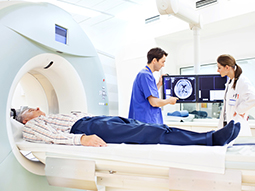How is interventional radiology used for women’s health?

Our interventional radiologists are experts in diagnosing and treating women of all ages using advanced imaging and minimally invasive procedures for less pain and faster recovery times than traditional surgery.
Interventional radiology is a safe, nonsurgical option for women experiencing common health concerns, such as excessive bleeding or pain caused by a range of conditions, including fibroids, adenomyosis, and pelvic congestions. Historically, traditional surgery was the only treatment available to alleviate many of these symptoms. Today, our board-certified interventional radiologists are able treat women with minimally invasive techniques, decreasing the recovery time and significantly lowering the risk of complications.
Because the procedures require only a small incision the size of a pinhole, interventional radiology is a safer—and, at times, more effective—alternative to open surgery. In addition, most patients are treated and discharged within 24 hours, getting them back to their regular routine as quickly as possible.
Interventional radiology for women’s health treatments
MedStar Health’s interventional radiologists are recognized nationally as leaders in treating women who suffer from uterine fibroids and adenomyosis, and our research into treatments for these conditions has helped pave the way for treatment across the country.
In fact, our MedStar Georgetown University Hospital experts have conducted research and published studies for more than two decades that have helped to define and improve the safety and effectiveness of uterine fibroid embolization. Our experienced team of interventional radiologists has published more studies on uterine fibroid embolization than any other group in the country.
Learn more about the interventional radiology treatment options we offer below.
Adenomyosis embolization
Adenomyosis is a noncancerous condition in the uterus that can cause excessive bleeding and pelvic pain. While uncommon, adenomyosis occurs when the tissue that lines the uterus grows into the muscular wall of the uterus. Our interventional radiologists have extensive experience in diagnosing and treating adenomyosis using advanced imaging techniques and embolization.
Pelvic congestion syndrome embolization
Approximately one third of all women will experience chronic pelvic pain in their lifetime. Sometimes, this pain stems from hard-to-detect varicose veins in the pelvic area, known as pelvic congestion syndrome.
For effective pain relief, our interventional radiologists stop blood flow to the abnormal veins through embolization, a minimally invasive, outpatient procedure.
Uterine fibroid embolization
Uterine fibroids are noncancerous growths that can arise in the uterus. This results in heavy or prolonged menstrual bleeding, pelvic pain, and uncomfortable pressure on the bladder. While traditional treatments required surgery to remove the uterus, our interventional radiologists are able to relieve pain and symptoms by delivering small embolization particles to block the blood supply to the fibroids via a small tube, or catheter.
Our providers

Expert interventional radiology care
Getting the care you need starts with seeing one of our interventional radiologists.
Our locations
Distance from Change locationEnter your location
MedStar Franklin Square Medical Center
9000 Franklin Square Dr. Baltimore, MD 21237
MedStar Georgetown University Hospital
3800 Reservoir Rd. NW Washington, DC, 20007
MedStar Good Samaritan Hospital
5601 Loch Raven Blvd. Baltimore, MD 21239
MedStar St. Mary's Hospital
25500 Point Lookout Rd. Leonardtown, MD 20650
MedStar Washington Hospital Center
110 Irving St. NW Washington, DC 20010









